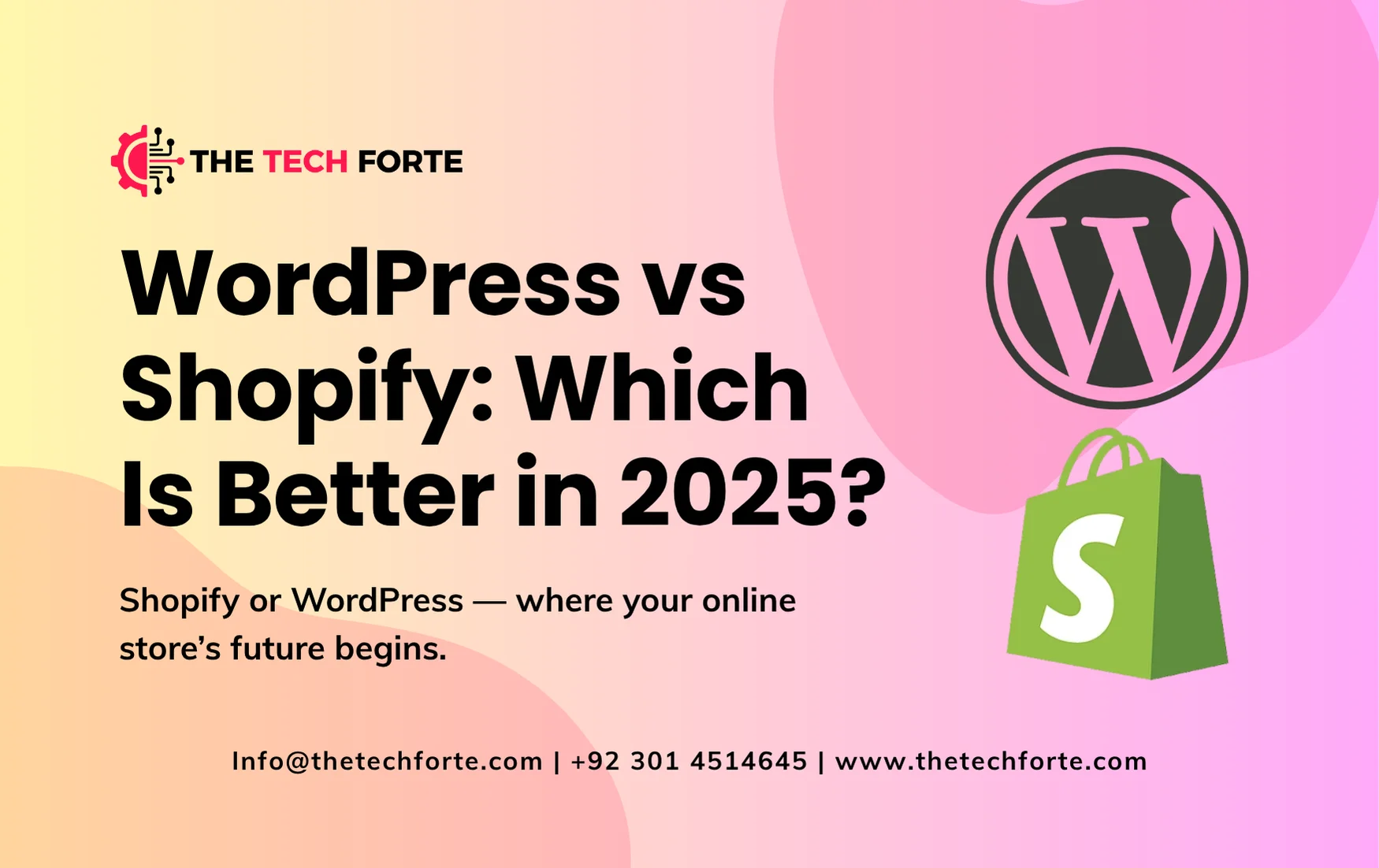
WordPress vs Shopify: Which Is Better in 2025?
In the fast-paced digital era of 2025, the question many entrepreneurs are asking is: WordPress vs Shopify 2025: which is better for online stores? Both platforms dominate the e-commerce website platforms space, offering powerful tools for businesses to create and manage online shops.
This detailed Shopify vs WordPress comparison will walk you through features, pricing, ease of use, customization, SEO performance, and more — helping you decide between WordPress or Shopify, which is better for your business. Whether you’re launching a startup or expanding your digital brand, understanding these platforms is key to choosing the best eCommerce platform 2025.
Read More: How to Backup and Restore WordPress Easily
Overview: Shopify vs WordPress for Online Stores
Both Shopify and WordPress have evolved significantly by 2025. Shopify is a hosted platform, meaning everything from hosting to security and payments is handled within its ecosystem. WordPress, on the other hand, is an open-source CMS (Content Management System) that gives you total control and flexibility — especially when paired with WooCommerce, its eCommerce plugin.
- Shopify simplifies store creation with drag-and-drop tools and built-in features.
- WordPress with WooCommerce offers greater customization for developers and content creators.
The real difference lies in how much control and responsibility you want over your site’s management, design, and scalability.
Shopify Pricing vs WordPress Pricing
When it comes to cost, the Shopify pricing vs WordPress pricing debate is one of the first questions business owners ask.
- Shopify Pricing (2025): Plans range from $29 to $399 per month. This includes hosting, SSL certificates, and access to the Shopify App Store. Additional fees may apply for premium themes or third-party apps.
- WordPress Pricing (2025): WordPress itself is free, but you’ll pay for hosting ($5–$30/month), a domain name, SSL, and possibly premium plugins or themes.
Overall, WordPress may be cheaper upfront, but Shopify provides all-in-one convenience. If you prefer minimal technical setup, Shopify’s pricing makes sense. However, if you value flexibility, WordPress offers more control over long-term costs.
Ease of Use: Shopify vs WordPress
The ease of use Shopify vs WordPress for small businesses comparison heavily depends on your technical background.
- Shopify for Beginners: Shopify is beginner-friendly. With its drag-and-drop builder and guided setup, you can create a professional store in hours without coding.
- WordPress eCommerce Setup: Setting up a WordPress store with WooCommerce involves more steps — installing plugins, configuring hosting, and managing backups — but gives more flexibility in the long run.
If simplicity is your priority, Shopify wins. But if you love to tinker and personalize every aspect of your store, WordPress remains unbeatable.
Read More: How to Speed Up Your WordPress Website
Design Flexibility and Customization
When comparing customization in WordPress and Shopify, WordPress comes out ahead in terms of creative control.
- WordPress: Offers thousands of free and premium themes, and with custom CSS or page builders like Elementor, you can design any layout imaginable.
- Shopify: Provides a curated set of sleek, mobile-optimized themes. However, customization beyond the template may require coding knowledge in Liquid (Shopify’s language).
In 2025, website design flexibility still favors WordPress, while Shopify focuses on streamlined simplicity.
eCommerce Features and Integrations
The WordPress WooCommerce vs Shopify feature comparison highlights both platforms’ strengths.
- Shopify: Excels in payment gateway options, inventory management, and product variation tools. It also supports multichannel selling on Amazon, eBay, and Instagram.
- WordPress WooCommerce: Offers advanced control over tax settings, digital downloads, and site extensions. Integration with plugins like Yoast, Rank Math, and Mailchimp makes it ideal for content-driven eCommerce.
For pure eCommerce functionality, Shopify wins for ease, while WooCommerce wins for versatility.
SEO Performance: Shopify vs WordPress
If SEO matters (and it should), the SEO performance Shopify vs WordPress for online store comparison is crucial.
- WordPress: Known for superior content optimization through plugins like Yoast SEO and Rank Math, plus total control over meta tags, URLs, and schema markup.
- Shopify: Provides solid SEO foundations, automatic sitemaps, and fast load times. However, advanced SEO customization is limited.
In 2025, WordPress still leads for SEO flexibility, while Shopify is perfect for store owners who want good SEO without deep technical knowledge.
Website Speed and Performance
Both platforms perform well, but a website speed comparison of WordPress vs Shopify reveals key differences.
- Shopify: Has optimized hosting built for speed, with global CDNs ensuring fast performance for every user.
- WordPress: Speed depends on your hosting provider and plugins. With optimization and caching tools like WP Rocket, WordPress can match Shopify’s performance.
Shopify wins on consistency, while WordPress rewards users who fine-tune their hosting environment.
Payment Gateways and Transaction Fees
Shopify supports over 100 payment gateway options, including its in-house Shopify Payments, which eliminates extra fees. However, using third-party gateways may add transaction costs.
WordPress WooCommerce, on the other hand, integrates with PayPal, Stripe, Square, and numerous other gateways without mandatory transaction fees. The flexibility here gives WordPress an advantage for global sellers looking to minimize costs.
Security and Reliability
Is Shopify more secure than WordPress? Generally, yes — at least for users who prefer minimal technical management.
- Shopify: Handles SSL certificates, PCI compliance, and security patches automatically.
- WordPress: Security depends on you — installing updates, using secure plugins, and managing firewalls. Tools like Wordfence and Sucuri can boost security, but they require configuration.
Shopify’s hosted nature ensures top-level protection, while WordPress gives control (and responsibility) to the user.
Marketing Tools and Integrations
Shopify integrates directly with Facebook, Google Ads, TikTok, and email marketing tools, enabling seamless campaign setup.
WordPress, meanwhile, thrives on plugin variety — you can connect Mailchimp, HubSpot, or any marketing platform through extensions.
When comparing AI-driven marketing tools, Shopify’s built-in analytics and automation tools make it easier for beginners to launch targeted campaigns, while WordPress excels at advanced content and funnel marketing.
Shopify vs WordPress for Small Businesses
If you’re a small business owner, choosing the right online store builder tools can make or break your brand.
- Shopify for Small Businesses: Ideal for entrepreneurs who want to launch quickly with minimal setup. Everything is built in, from hosting to payment gateways.
- WordPress for Small Businesses: Better for businesses that value storytelling, blogs, and custom branding. With WooCommerce, you can tailor every part of the buying experience.
In short, Shopify = convenience, WordPress = control.
Which Platform Is Better for Dropshipping?
When it comes to Shopify vs WordPress for online store or dropshipping, Shopify clearly has the edge.
Shopify integrates seamlessly with Oberlo, Spocket, and DSers, making product import and fulfillment effortless. WooCommerce supports dropshipping, too, but the setup involves more plugins and manual configuration.
So, if your goal is a plug-and-play dropshipping business, Shopify is your best bet in 2025.
Scalability and Growth Potential
Both platforms can scale, but differently:
- Shopify: Perfect for fast-growing brands that prefer simplicity and dedicated support. Enterprise-level plans like Shopify Plus offer scalability for large stores.
- WordPress: Scales through better hosting, caching, and custom development. It’s the best choice for businesses wanting to expand features over time.
Ultimately, Shopify simplifies scaling, while WordPress provides flexibility to grow in any direction
Migration Between Platforms
Can I migrate from Shopify to WordPress easily? Yes — several plugins and migration services make it possible to transfer your products, pages, and customers.
However, migration requires attention to SEO redirects and URL structure to avoid ranking loss. Shopify’s export tools and WordPress import features make the process smoother than before, but still, it’s best handled with expert guidance.
FAQ
In 2025, both are excellent. Shopify is best for beginners and businesses wanting simplicity. WordPress is better for full control and advanced SEO.
Yes. Shopify’s interface is intuitive, while WordPress requires more setup and maintenance.
WordPress wins for SEO customization. However, Shopify provides strong built-in optimization that suits most business needs.
Yes, but it requires careful handling of URLs, plugins, and product data. Many tools make migration easier in 2025.
Yes, because Shopify manages all hosting and updates automatically. WordPress can be just as secure with proper plugins and maintenance.
Shopify is best for beginners due to its plug-and-play setup. WordPress suits users who want flexibility and don’t mind a learning curve.
Conclusion: The Final Verdict — WordPress or Shopify in 2025?
So, WordPress vs Shopify 2025 — which is better?
If you want simplicity, reliability, and fast setup, Shopify is your best eCommerce platform 2025 companion. But if you crave full creative control, deep SEO customization, and scalability, WordPress with WooCommerce reigns supreme.
Ultimately, both platforms are winners — the right choice depends on your business goals, technical comfort, and budget.






